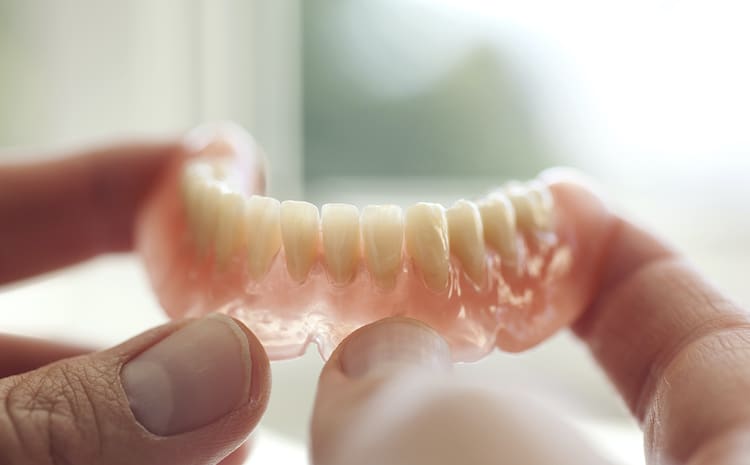Proper denture care is essential for ensuring longevity and comfort. Dentures require regular maintenance to function effectively and remain comfortable. Neglecting proper care can lead to discomfort, poor fit, and damage. Understanding the best practices for maintaining your denture better ensures it lasts as long as possible.
Understanding Your Dentures
Dentures are prosthetic devices that replace missing teeth. They often restore both function and aesthetics, allowing you to eat, speak, and smile with confidence. Dentures come in two main types: full and partial. Full dentures replace all teeth in either the upper or lower jaw, while partial dentures fill in gaps where some natural teeth remain. Each type requires specific care and maintenance. Your dentist will provide instructions tailored to your specific denture type, ensuring you know how to care for them properly.
Daily Cleaning Routine
Cleaning your dentures daily is crucial for preventing plaque buildup and maintaining oral hygiene. Use a soft-bristled brush specifically designed for dentures to clean them. Hard brushes can scratch the surface, leading to damage over time. Rinse your dentures under running water after meals to remove food particles and debris. This simple step helps prevent the accumulation of bacteria and plaque. Use a non-abrasive denture cleaner for a thorough cleaning at least once a day. Avoid regular toothpaste, as it can be too harsh and abrasive for denture surfaces. Regular cleaning helps keep your dentures looking their best and functioning properly.
Soaking Dentures Overnight
Soaking your dentures overnight is essential for keeping them moist and maintaining their shape. Dentures should never dry out, as this can cause warping and an improper fit. Use a denture-soaking solution recommended by your dentist to ensure proper care. Avoid hot water, which can distort the denture and compromise its fit. In the morning, rinse your dentures thoroughly before use to remove any residual soaking solution. This practice helps maintain the integrity of the denture material and ensures a comfortable fit.
Handling Dentures with Care
Handle your dentures carefully to avoid accidental damage. When cleaning or removing them, hold them over a soft towel or a basin of water. This cushions any accidental drops, preventing breakage. Avoid bending or twisting the plastic or clasps, as these parts are delicate and can break easily. Proper handling helps extend the life of your dentures and could prevent costly repairs or replacements.
Regular Dental Check-Ups
Regular dental check-ups are crucial for maintaining the health and fit of your denture. Visit your dentist regularly for check-ups and professional cleanings. These visits ensure your dentures fit properly and function as intended. Your dentist can make necessary adjustments to improve comfort and fit. They will also check for signs of wear or damage, addressing any issues before they become more serious. Early detection and intervention often prevent more significant problems later on, ensuring your dentures remain a reliable part of your daily life.
Maintaining Oral Hygiene
Good oral hygiene is vital for supporting denture health and overall oral well-being. Brush your gums, tongue, and palate daily with a soft-bristled toothbrush. This practice removes plaque and stimulates circulation, promoting healthy tissues. A healthy mouth ensures a better fit for your dentures and reduces the risk of oral infections. Regular oral hygiene also helps prevent bad breath and other issues that can arise from poor dental care.
Dietary Considerations
Choose your foods carefully when wearing dentures to avoid damage and discomfort. Avoid sticky or hard foods that may damage your dentures or cause them to shift. Cut food into small, manageable pieces to make chewing easier. Chew evenly on both sides of your mouth to maintain balance and prevent undue stress on one side of the mouth. This practice helps preserve the fit and function of your dentures, allowing you to enjoy a wide variety of foods without worry.
Recognizing Signs of Wear
Be alert to signs of wear or damage to your dentures. Look for cracks, chips, or loose teeth, as these issues can affect fit and function. If you notice any problems, consult your dentist immediately. Prompt action could prevent further damage and discomfort, ensuring your dentures continue to serve you well. Regular self-examinations and professional check-ups can help you catch potential problems early, allowing for timely repairs or adjustments.
Storing Dentures Safely
Store your dentures safely when not in use to prevent accidental damage or loss. Keep them out of reach of children and pets, who may inadvertently cause harm. Use a sturdy container with a secure lid to protect your dentures from dust and debris. Proper storage ensures your dentures remain in good condition and ready for use whenever you need them.
Replacing Dentures
Dentures do not last forever and may need replacement over time. Factors such as wear, changes in your mouth, and material degradation can necessitate a new denture. Regular dental visits will help determine when it’s time for a replacement. Your dentist will advise you on the best course of action. Staying proactive about replacement better ensures you maintain your quality of life and oral health.
At Advanced Laser & Cosmetic Dentistry in Carpentersville, IL, our experts can guide you in choosing the right denture care products and techniques. We also offer a range of other restorative dental options if you suffer from tooth loss. Contact us today to schedule a consultation and learn more.

